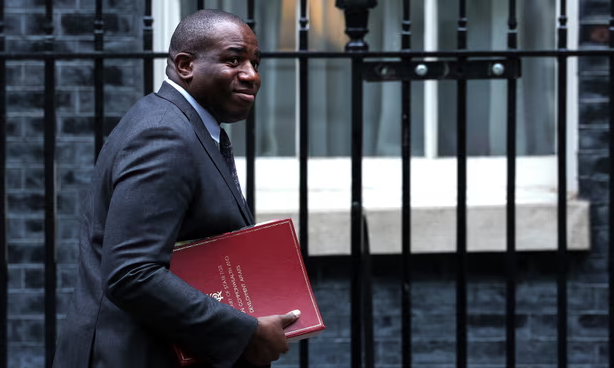Regarding China’s persecution of Uyghurs, Labour retracts its call for a genocide ruling.
Labour has backtracked on plans to push for formal recognition of China’s treatment of the Uyghurs as genocide in the run-up to David Lammy’s trip to the country this weekend.
The foreign secretary is expected to arrive in Beijing on Friday for high-level meetings before travelling to Shanghai on Saturday.
The trip marks a shift in the British government’s approach to China, with ministers seeking to improve engagement and build closer economic ties. Trade between the UK and China is worth £110bn a year.
Senior government figures are bullish about their approach, pointing out that allies including the US and the EU have maintained high-level engagement with China in recent years while the UK has fallen behind.
As part of this diplomatic rapprochement, Labour has dropped its tough stance towards Beijing over its treatment of the Uyghur Muslim minority.
China has detained Uyghurs at camps in the north-west region of Xinjiang, where for years there have been allegations of torture, forced labour and sexual abuse. The Chinese government claims the camps carry out “re-education” to combat terrorism.
The European parliament passed an emergency resolution this week censuring China’s repression of the Uyghurs and calling for the release of detainees.
In opposition, Labour backed a Commons motion that declared China’s conduct genocide and urged the government to seek formal recognition of this through the UN and with other countries.
Stephen Kinnock, then shadow Asia minister, said in 2021 that it was not enough to leave the matter to international courts because China would have to consent to an investigation.
“Ideally, a competent international court would examine this evidence, but there is no prospect that either the ICC or the international court of justice will be able to do so, as this would require the consent of China,” Kinnock told the Commons.
“The foreign secretary should seek to introduce a general assembly resolution requesting an advisory opinion from the international court of justice on the question of genocide. We should also explore legal avenues via other international treaties and conventions.”
Lammy confirmed this was still his position at a Fabian Society event in 2023 and said a Labour government would “act multilaterally with our partners” to pursue legal routes towards declaring China’s actions genocide.
But a government source told the Guardian that “genocide is a determination for competent international courts to decide”.
A spokesperson for the Foreign, Commonwealth and Development Office said: “This government stands firm on human rights, including in Xinjiang, where China continues to persecute and arbitrarily detain Uyghurs and other predominantly Muslim minorities. This includes raising our concerns at the highest levels of the Chinese government and coordinating efforts with our international partners to hold China to account for human rights violations.”
Lammy’s two-day visit to China was confirmed by the Chinese foreign ministry spokesperson Mao Ning on Thursday.
A UK business source briefed on the visit said Labour was pursuing the same strategy as Rishi Sunak and Boris Johnson, but more successfully.
“All the signs are that they are taking the engagement side of the relationship much much more positively and seriously than the previous government,” they said. “They seem to be pretty robust about being sensible that engagement doesn’t mean agreement.”
“What we’re seeing from our perspective is recognition of the importance to the UK growth agenda of a sensible trade and investment with China.”
Rachel Reeves, the chancellor, is drawing up plans to visit the country early next year and restart two high-level economic forums, the Economic and Financial Dialogue and the Joint Economic and Trade Commission. Labour also wants to cooperate with China, the world’s biggest polluter, on tackling the climate crisis.
The prime minister’s official spokesperson told reporters on Thursday: “This is necessary pragmatic engagement with China in the UK’s interest. We will challenge China where we need to and we will seek to have a consistent and long-term, strategic approach.”
Successive Conservative leaders faced pressure from hawkish Tory backbenchers – some of whom have been placed under sanctions by Beijing – over their approach to China.
Labour is likely to find internal party management easier on this issue, although it is still likely to come under pressure over China’s actions in Hong Kong, Taiwan and Xinjiang.
Lammy met his counterpart, Wang Yi, in July in Laos, where the foreign secretary raised human rights, Ukraine and parliamentarians under sanctions.
Rahima Mahmut, the UK director of the World Uyghur Congress, said: “In opposition, Labour accurately described the suffering of my people as genocide. Now it seems they won’t even see through their promises to seek genocide recognition with allies at the UN.
“No words can describe the distress of the Uyghur community at this disappointment.”













